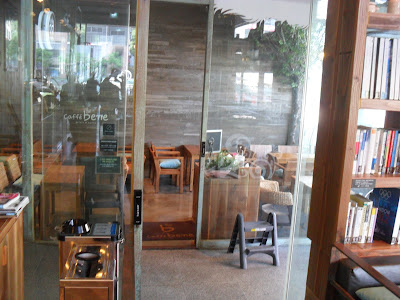Caffe Bene serves little waffles with a variety of toppings available, coffee, and gelato. The waffles will run about 3000 to 4000 won depending on what type you order. Coffee is around 4000 - 5000 won.
The inside of the shop is kind of small, but there is another section across the hall. The chairs are pretty comfy, but they are kind of low.
That would be a honey egg sandwich, and it tasted like it sounds: not good. I took it anyway even though I told the girl that's not what I ordered - I ordered a caramel banana waffle. She started babbling something in Korean about a "special set" and pointing at the menu, but I have no idea what she was saying - I can understand some Korean, but this chick had a retainer or braces and I couldn't understand a single word of what she was saying. I just threw up my hands and said, "whatever" and took the nasty sandwich even though I never uttered the words "set" or "sandwich" when I ordered. I guess my "waffle banana caramel" sounded like "honey egg sandwich" to her. I have no clue how, though. The sandwich wasn't good, though. I took two bites and that's it. I even peeled the ham off to make it more edible. The bread was sweet (hence "honey" in the name) and chewy and the piece of "egg" was rubbery and tasteless. At least my iced caramel machiatto was ok.
Overall, my experience here was not good and I will not be going back - there are other places in Yeongtong to get waffles.
As a side note, this kind of problem happens a lot to foreigners in Korea (at least foreigners that I know) - especially in taxis. Koreans expect to NOT be able to understand you to begin with, which already biases their listening skills when you talk to them. The problem isn't your pronunciation - most Koreans seem to be completely unable to connect the dots when you say the wrong word. For example, "pojang" means "take out" and is used for food take out: "take out" or "to go" is used for drinks like at a coffee shop. If you use "pojang" for your coffee at a coffee shop, oftentimes the employee will look at you with a confused look and have no clue what you're talking about. They are just completely unable to make that word meaning leap for some reason. In English, we can understand a wide variety of accents and understand people even if they use the wrong word, usually. However, in Korean, that seems to not be the case. I used to (and still do) tell the story of when I first came to Korea and would take a a taxi to Homeplus. The conversation would go something like this:
Me: Ingyedong Homeplus kajuseyo.
Driver: Odi?
Me: Ingyedong Homeplus.
Driver: Uuhhh...moolahyo...
Me: *sigh* Ingyedongah Homeplusah. (and a little part of my soul died)
Driver: Ahh! Homeplusah! Nay!!
For some ungodly reason, they just can't make that leap in understanding from "Homeplus" to "Homeplus-ah" because you aren't saying it the "Korean" way.
So, since they don't expect to be able to understand you, they purposely don't no matter what you say or how well you say it.
At any rate, yeah, there's a Caffe Bene in Yeongtong that will serve you a nasty-ass sandwich instead of a yummy waffle if you want to go check it out.






No comments:
Post a Comment